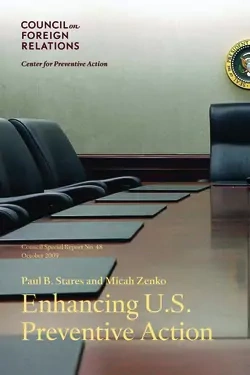
Enhancing U.S. Preventive Action

- Council Special Report
- Concise policy briefs that provide timely responses to developing crises or contributions to current policy dilemmas.
More on:
Overview
Few would dispute that preventing conflict, instability, and humanitarian disaster is preferable to confronting these problems after they arise. Preventive measures are generally less expensive than remedial ones. They also allow policymakers to address potential crises before they threaten international stability, U.S. interests, and human lives. Building an effective U.S. government capacity to take preventive action, however, has proved an elusive goal. And the challenges to achieving it have perhaps never been greater. The urgent problems faced by the United States, including wars in Iraq and Afghanistan, nuclear development in Iran and North Korea, and the aftermath of a deep economic crisis, make it difficult for policymakers to focus resources and attention on potential future threats. But these same urgent challenges also make preventive action more useful. In this climate, measures that could obviate further military commitments, save money, and resolve tensions that might consume more time and resources later are a sound investment.
In this Council Special Report, sponsored by the Center for Preventive Action, Paul B. Stares and Micah Zenko evaluate the U.S. system for foreseeing and heading off crises. They assess in detail current U.S. practices with regard to different types of preventive action, examining such topics as intelligence community analyses; “watchlists” of states at risk; interagency planning processes; foreign assistance programming; and the work of the State Department office created in 2004 to lead U.S. government efforts in this area. The report cites an array of shortcomings in how the government plans and conducts its preventive activities, a situation that can leave policymakers scrambling to respond to crises after they break out. To improve this, the authors recommend a variety of steps, including revising and strengthening the strategic planning process under the leadership of the National Security Council, improving and consolidating intelligence products and connecting them more closely to policymakers, and providing additional funding for preventive efforts.
Enhancing U.S. Preventive Action is a comprehensive contribution to the debate on a complex topic. It offers detailed recommendations that could bolster the ability of the United States to identify and address threats before they erupt into crises. It also makes a strong case that given the military and economic constraints facing the United States today, such preventive action is not a luxury but a necessity.
More on:
 Online Store
Online Store